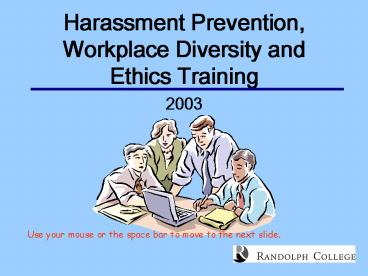Harassment Prevention, Workplace Diversity and Ethics Training PowerPoint PPT Presentation
1 / 17
Title: Harassment Prevention, Workplace Diversity and Ethics Training
1
Harassment Prevention, Workplace Diversity and
Ethics Training
- 2003
Use your mouse or the space bar to move to the
next slide.
2
Purpose of Training
- Gain a better understanding of harassment,
diversity, and ethics as a whole. - Know what to do when something comes up, so that
it is handled quickly keeping things in control
so they dont get too extreme and blow up. (Roles
and responsibilities) - Show everyone the Colleges commitment to a NO
TOLERANCE response to harassment.
3
What is Diversity?
- ? Recognition, appreciation and the appropriate
response to individual differences that exist
here on campus. - ? The goal of diversity is to enhance individual
differences, so that respect and dignity is
visible in the workplace.
4
Changing Face of the Nation
- Per the U.S. Census Bureau
- Non-Caucasians will make up more than one-third
of the U.S. population by the year 2010 and
approximately half of the population by 2050 - Additional statistics suggest that by 2005,
minorities may represent more than 28 of the
American workforce.
5
Why is Talking About Diversity Important?
- Overcoming socialization
- Talk and think about diversity, constant
awareness - College promotes and supports diversity
6
Legal Requirements
- Equal Employment Opportunity Laws
- Title VII
- The Age Discrimination in Employment Act (ADEA)
- The Americans with Disabilities Act (ADA)
7
Additional Legal Requirements
- Equal Pay Act
- Harassment can be based on more than sex
- Hostile work environment
8
Who Can Commit Harassment?
- Co-Workers
- Customers
- Supervisors
- Subordinates
9
Who Can Experience Harassment?
- Specific Individual
- Bystanders or witnesses This could be a person
who witnesses or hears repeated inappropriate
language or behavior.
10
What Isnt Harassment?
- Single stray remark, unless it is severe
- Compliments
- Occasional teasing
11
What Is Sexual Harassment?
Hostile Work Environment - Unwelcome conduct of a
sexual nature, which creates an intimidating,
hostile or offensive work environment that
affects an individuals work performance. Quid
Pro Quo Means this for that or if you give
something you will receive something in return.
This usually involves one person having power or
authority over the other.
12
What To Do If You Think You Have Been Harassed
- Let the person know that the attention or act is
unwelcome. - Make a note of exactly what happened include
when, where, and who was around. - Report it to your supervisor or the Director of
Personnel Services.
13
When Is The College Liable?
- Supervisors
- Non-supervisors
14
Ethics
- The integrity, reputation and success of
Randolph-Macon Womans College ultimately depends
upon the individual actions of each employee. - Conduct business in a fair, ethical and
forthright manner. Keep in mind, if something
doesnt feel right, it probably isnt right!
15
Ethics
- Use good judgment
- Adhere to high ethical standards
- Avoid situations that create an actual or
perceived conflict between personal interests and
those of R-MWC
16
Summary
- Randolph-Macon Womans College is committed to
providing an environment free of intimidation and
all forms of discrimination and conduct which can
be considered harassing, coercive or disruptive.
We have a NO TOLERANCE POLICY. - Use good judgment with relations to harassment,
diversity and ethics. Remember how things are
perceived can play a big part. - If you come in contact or are witness to any type
of harassment or have a question about an ethical
behavior, you are asked to report or talk with
the Director of Personnel Services.
17
Contact Information
- Once you have finished this PowerPoint
presentation, double click below to e-mail
Personnel Services with a short note letting us
know that you have viewed the Diversity,
Harassment Ethics Training. - If you have any questions about anything in this
presentation contact the Director of Personnel
Services at ext. 4154. - ssaunders_at_rmwc.edu

